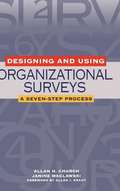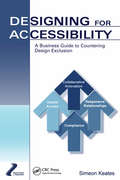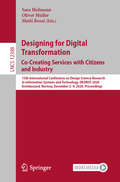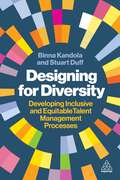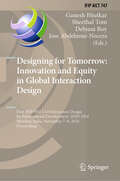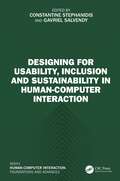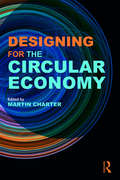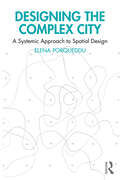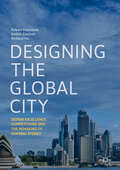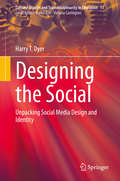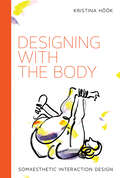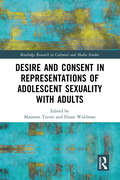- Table View
- List View
Designing and Managing Programs: An Effectiveness-Based Approach
by Peter M. Kettner Lawrence L. Martin Robert M. MoroneyDesigning and Managing Programs: An Effectiveness-Based Approach, Fourth Edition, is an updated version of THE classic book on program planning, design, and implementation. This new edition is written in a deliberate manner designed to help students logically follow the program planning process. Students will learn to track one phase to the next, resulting in a solid understanding of the issues of internal consistency and planning integrity. The book's format guides students from problem analysis through evaluation, enabling them to apply these concepts to their own program plans.
Designing and Using Organizational Surveys
by Allan H. Church Janine WaclawskiThis book will serve as an excellent primer for executives and practitioners who are about to embark on an organizational survey
Designing for Accessibility: A Business Guide to Countering Design Exclusion (Human Factors and Ergonomics)
by Simeon KeatesA step by step guide, this book covers how to design products that offer the right combination of functionality, usability, and accessibility for all consumers. The author articulates why these three elements can make the critical difference in remaining competitive and economically viable over the long term. He provides insightful case studies that illustrate the corporate benefits for designing accessibility, in addition to carefully selected and valuable figures and tables. Demystifying what is involved in designing inclusive products for all users, the book highlights numerous examples for designers, such as creating a tool for Web browsing for older adults, as well as digital television access.
Designing for Digital Transformation. Co-Creating Services with Citizens and Industry: 15th International Conference on Design Science Research in Information Systems and Technology, DESRIST 2020, Kristiansand, Norway, December 2–4, 2020, Proceedings (Lecture Notes in Computer Science #12388)
by Oliver Müller Sara Hofmann Matti RossiThis book constitutes the thoroughly refereed proceedings of the 15th International Conference on Design Science Research in Information Systems and Technology, DESRIST 2020, held in Kristiansand, Norway, in December 2020. The 28 revised full research papers included in the volume together with 7 research-in-progress papers and 9 prototype papers, were carefully reviewed and selected from 93 submissions. They are organized in the following topical sections: digital public services; data science; design principles; methodology; platforms and networks; and service science. Due to the Corona pandemic this event was held virtually.
Designing for Diversity: Developing Inclusive and Equitable Talent Management Processes
by Binna KandolaWhat measures do you use to spot talent and assess employee performance? How do you decide who gets promoted? Are these methods fair and inclusive?Talent management is a cornerstone of modern organizational strategy but it has consistently fallen short in achieving meaningful diversity. Designing for Diversity challenges the deeply rooted assumptions that have shaped traditional talent management systems and critiques the philosophies that often reinforce the status quo. This book then offers actionable strategies to create systems and processes that genuinely identify and nurture individuals with leadership potential.While many DEI efforts aim to signal progress, they can inadvertently sustain inertia. This book empowers organizations to move beyond surface-level solutions and implement practices that drive real, measurable change. It explores each element of talent management from performance management systems and talent identification methods, through to talent development and promotion processes. This book also examines the limitations of target setting and the benefits of both formal and informal mentoring. The results is a new paradigm for identifying leaders, fostering diversity, and enhancing competition for senior roles. Whether you're a business leader, HR professional or advocate for equity in the workplace, Designing for Diversity is your essential guide to creating a future where talent management and diversity thrive together.
Designing for Play (Routledge Revivals)
by Barbara E. HedricksThis title was first published in 2001. Architects, landscape designers, builders, gardeners and teachers have all at some time been called upon to design a play area. Unfortunately, this diversity has not resulted in a similar diversity of design solutions for this very problematic task. Despite a proliferation of "how to" books on this subject, playgrounds have remained virtually the same throughout the world since their creation over a century ago.This is not a "how to" design book. Instead, based on thirty years experience as a specialist play area designer, Barbara Hendricks details a radically new approach, applying cutting-edge thinking from child development and child psychology to find innovative design solutions, challenging the established notions of play provision. Covering key sociological, public policy, environmental and design issues, this book provides designers with an exploration of, and guide to, designing from a "child's eye" view of the world.Beautifully crafted and copiously illustrated with numerous examples of recently designed playgrounds, this book is not only stimulating and informative, but fun to read and seriously playful in itself.
Designing for Tomorrow: First IFIP WG 13.8 Interaction Design for International Development, IDID 2024, Mumbai, India, November 7–9, 2024, Proceedings (IFIP Advances in Information and Communication Technology #747)
by Ganesh Bhutkar Sheethal Tom Debjani Roy Jose Abdelnour-NoceraThis book constitutes the refereed proceedings of the First IFIP Working Group 13.8 Interaction Design for International Development, IDID 2024, held in Mumbai, India, during November 7–9, 2024. The 14 full papers included in this book were carefully reviewed and selected from 17 submissions. The aim of this working group is to pursue research and promote the discipline of Human-Computer Interaction (HCI) in an international context. It also provides a platform, where both emerging and experienced researchers from academia and industry can converge to exchange their latest findings in the ever-evolving realm of HCI and International Development.
Designing for Usability, Inclusion and Sustainability in Human-Computer Interaction
by Gavriel Salvendy Constantine StephanidisAddressing the rising prevalence of interactive systems in our daily lives, this book focuses on the essential aspects of usability, user experience (UX), and inclusive design.This book Discusses both theoretical and practical aspects, approaches, and methods for the design process and the collaboration between HCI Design and Software Engineering. Expands to practical topics such as web and mobile design, aesthetics, information visu- alization, information architecture, and navigation design, along with relevant guidelines and standards. Tackles the issue of persuasive interfaces that has arisen as a crucial concern in the contemporary digitalized landscape. Emphasizes the importance of making computing systems inclusive and user-friendly for a diverse range of users, including children, older adults, and persons with disabilities. Highlights the significance of usability, underscoring its key role in enhancing the overall user experience of interactive products.This book has been written for individuals interested in Human-Computer Interaction research andapplications..
Designing for the Circular Economy
by Martin CharterThe circular economy describes a world in which reuse through repair, reconditioning and refurbishment is the prevailing social and economic model. The business opportunities are huge but developing product and service offerings and achieving competitive advantage means rethinking your business model from early creativity and design processes, through marketing and communication to pricing and supply. Designing for the Circular Economy highlights and explores ‘state of the art’ research and industrial practice, highlighting CE as a source of: new business opportunities; radical business change; disruptive innovation; social change; and new consumer attitudes. The thirty-four chapters provide a comprehensive overview of issues related to product circularity from policy through to design and development. Chapters are designed to be easy to digest and include numerous examples. An important feature of the book is the case studies section that covers a diverse range of topics related to CE, business models and design and development in sectors ranging from construction to retail, clothing, technology and manufacturing. Designing for the Circular Economy will inform and educate any companies seeking to move their business models towards these emerging models of sustainability; organizations already working in the circular economy can benchmark their current activities and draw inspiration from new applications and an understanding of the changing social and political context. This book will appeal to both academia and business with an interest in CE issues related to products, innovation and new business models.
Designing the Complex City: A Systemic Approach to Spatial Design
by Elena PorquedduHow can designers address the emergent self-organizing nature of complex urban environments? Designing the Complex City highlights how both an excess and a lack of design control might contrast the lively complexity of cities, their adaptive and evolutionary capacity. By using key concepts from systems thinking, complexity sciences, life sciences, cognitive sciences, and social sciences, the book frames a systemic spatial design approach aimed at enhancing the potential of different spatial design disciplines to navigate place-specific emergent transformations without overdetermining their formal outcome. A range of heterogeneous case studies, developing at different scales, show how embracing a design approach that is embodied, open-ended, contextually responsive, incremental and adaptive does not question the relevance of designers’ specific skills in shaping the physical structure of cities; it may rather increase their potential to effectively intervene in complex adaptive cycles of urban decay and self-regeneration.Designing the Complex City provides insights for students, researchers, and academics in architecture, interior design, urban and landscape design, planning theory, and urban studies. It is essential reading for all designers who seek to proactively and meaningfully intervene in spontaneous socio-spatial dynamics.
Designing the Global City: Design Excellence, Competitions And The Remaking Of Central Sydney
by Robert Freestone Gethin Davison Richard HuThis text explores how architectural and urban design values have been co-opted by global cities to enhance their economic competitiveness by creating a superior built environment that is not just aesthetically memorable but more productive and sustainable. It focuses on the experience of central Sydney through its policy commitment to ‘design excellence’ and more particularly to mandatory competitive design processes for major private development. Framed within broader contexts that link it to comparable urban policy and design issues in the Asia-Pacific region and globally, it provides a scholarly but accessible volume that provides a balanced and critical overview of a policy that has changed the design culture, development expectations, public realm and skyline of central Sydney, raising issues surrounding the uneven distribution of benefits and costs, professional practice, representative democracy, and implications of globalization.
Designing the Music Business: Design Culture, Music Video and Virtual Reality (Music Business Research)
by Guy MorrowThis book addresses the neglect of visual creativities and content, and how these are commercialised in the music industries. While musical and visual creativities drive growth, there is a lack of literature relating to the visual side of the music business, which is significant given that the production of meaning and value within this business occurs across a number of textual sites.Popular music is a multimedia, discursive, fluid, and expansive cultural form that, in addition to the music itself, includes album covers; gig and tour posters; music videos; set, stage, and lighting designs; live concert footage; websites; virtual reality/augmented reality technologies; merchandise designs; and other forms of visual content. As a result, it has become impossible to understand the meaning and value of music without considering its relation to these visual components and to the interrelationships between them. Using design culture theory, participant observation, interviews, case studies, and a visual methodology to explore the topic, this research-based book is a valuable study aid for undergraduate and postgraduate students of subjects including the music business, design, arts management, creative and cultural industries studies, business and management studies, and media and communications.
Designing the Olympics: Representation, Participation, Contestation (Routledge Research in Sport, Culture and Society)
by Jilly TraganouDesigning the Olympics claims that the Olympic Games provide opportunities to reflect on the relationship between design, national identity, and citizenship. The "Olympic design milieu" fans out from the construction of the Olympic city and the creation of emblems, mascots, and ceremonies, to the consumption, interpretation, and appropriation of Olympic artifacts from their conception to their afterlife. Besides products that try to achieve consensus and induce civic pride, the "Olympic design milieu" also includes processes that oppose the Olympics and their enforcement. The book examines the graphic design program for Tokyo 1964, architecture and urban plans for Athens 2004, brand design for London 2012, and practices of subversive appropriation and sociotechnical action in counter-Olympic movements since the 1960s. It explores how the Olympics shape the physical, legal and emotional contours of a host nation and its position in the world; how the Games are contested by a broader social spectrum within and beyond the nation; and how, throughout these encounters, design plays a crucial role. Recognizing the presence of multiple actors, the book investigates the potential of design in promoting equitable political participation in the Olympic context.
Designing the Purposeful Organization
by Clive WilsonGlobalization, competition and recession have created an overwhelming pressure on organizations to deliver growth. This has often resulted in tough performance targets being pushed down the line. Hard-hitting management may deliver short-term results but in the longer term key people burn out or leave, and business performance falls back. Designing the Purposeful Organization explains how to implement a more enlightened and authentic leadership style that aligns people's strengths to the delivery of a compelling future. It draws on a unique framework that helps leaders manage the eight elements essential for high performance: purpose, vision, engagement, structure, character, results, success and talent. It moves beyond the boundaries of transactional performance (pay me X and I'll deliver Y) to a purpose-centred performance that releases talent, creativity and engagement. It features case studies from Google, Whole Foods Market, the NHS and the London 2012 Olympics and is ideal for practitioners in organization development, senior HR managers and business leaders. This book demonstrates how business performance can be inspired beyond boundaries by aligning people to a compelling purpose.
Designing the Social: Unpacking Social Media Design and Identity (Cultural Studies and Transdisciplinarity in Education #11)
by Harry T. DyerThis book uses data collected from in-depth interviews with young people over the course of a year to explore the complex role of social media in their lives, and the part it plays in shaping how they understand and present their identity to a broad public on a wide array of platforms. Using this data, the book proposes and develops a new theoretical framework for understanding identity performances. Comic Theory, detailed in this book, centres on a consideration of the role of social media design in shaping identity, and explores the ways in which socio-culturally grounded users engage in acts of compromise, novelty, and negotiation with social media designs and digital technologies to produce unique identity performances.Positioned within the field of educational research, this book overtly challenges assumptions and myths about the internet as a neutral source of knowledge, instead exploring the way in which designs and technologies shape who we interact with and how we understand what it is to be social. Moving beyond the over-used ‘digital natives’ paradigm, this book makes a clear case that educators and education researchers need to move beyond a focus on coding and digital skills alone, highlighting the pressing need to take explicit account of the overlaps between digital technology, culture, and education.
Designing with the Body: Somaesthetic Interaction Design (Design Thinking, Design Theory)
by Kristina HookInteraction design that entails a qualitative shift from a symbolic, language-oriented stance to an experiential stance that encompasses the entire design and use cycle. With the rise of ubiquitous technology, data-driven design, and the Internet of Things, our interactions and interfaces with technology are about to change dramatically, incorporating such emerging technologies as shape-changing interfaces, wearables, and movement-tracking apps. A successful interactive tool will allow the user to engage in a smooth, embodied, interaction, creating an intimate correspondence between users' actions and system response. And yet, as Kristina Höök points out, current design methods emphasize symbolic, language-oriented, and predominantly visual interactions. In Designing with the Body, Höök proposes a qualitative shift in interaction design to an experiential, felt, aesthetic stance that encompasses the entire design and use cycle. Höök calls this new approach soma design; it is a process that reincorporates body and movement into a design regime that has long privileged language and logic. Soma design offers an alternative to the aggressive, rapid design processes that dominate commercial interaction design; it allows (and requires) a slow, thoughtful process that takes into account fundamental human values. She argues that this new approach will yield better products and create healthier, more sustainable companies. Höök outlines the theory underlying soma design and describes motivations, methods, and tools. She offers examples of soma design “encounters” and an account of her own design process. She concludes with “A Soma Design Manifesto,” which challenges interaction designers to “restart” their field—to focus on bodies and perception rather than reasoning and intellect.
Designmethoden im Zeitalter ihrer technischen Reproduzierbarkeit (Würzburger Beiträge zur Designforschung)
by Gerhard Schweppenhäuser Christian Bauer Judith-Frederike PoppDie Beiträge in diesem Band spiegeln den Stand der Reflexions- und Forschungsprozesse an der Fakultät Gestaltung der TH Würzburg-Schweinfurt, der HBKsaar und der New Design University in St. Pölten. Sie repräsentieren einen Prozess der Aufklärung, dessen Prüfstein Walter Benjamins Frage ist, wie sich ›die Art und Weise der Sinneswahrnehmung‹ geschichtlich gewachsener Kollektive durch neue Medientechnologien verändert.
Designology: How to Find Your PlaceType & Align Your Life with Design
by Dr. Sally AugustinA simple guide to creating spaces at home and work that align with your personality type and support your goals—with the help of science. Discover a new paradigm: Are you an adventurer or a visionary? A maverick or a maven? Designology makes design personal through environmental and design psychologist Sally Augustin&’s 8 personality &“Placetypes&” that characterize the different ways we can relate to the space around us.Personalize everything: What color should you paint your child&’s bedroom? How do shapes and patterns influence how you think in a space? How do room dimensions influence you psychologically? Designology answers all these questions and more with practical how-to advice and real-world examples sure to help make your house a happier place to be.Move forward with your design projects: Bust through the design paralysis that affects so many by applying verified science-based insights. Designology will help you regain control of your design-related efforts with suggestions customized to your personality and space-related needs.Find out what really matters: Designology teaches you how smells, textures, and other factors in your home influence your happiness. It shows you how your personality and ideal design styles are really related. Readers will learn about:· How to sound-scape a place whether they need to concentrate or think creatively· How to use scents in their home to help their family feel healthier· What to read into their spouse&’s desktop landscape· How to use paint to make their living room feel more comfortable· And much more!Take on your intimidating design tasks with confidence using this practical, personalizable how-to guide.
Designs for Living: A Comparative Approach to Normalisation for the New Millennium (Routledge Revivals)
by Steven CarnabyFirst published in 1999, this volume explores how the principle of normalisation informs British learning disability services by instructing them to help service users acquire behaviours and characteristics which are as 'culturally normative as possible'. While many studies have attempted to assess the efficacy of this approach, their measurement criteria are usually based on levels of competence and participation - values themselves derived from the principle of normalisation. The case study in this volume compares services in London to services in Milan, Northern Italy,where the concept of deinstitutionalisation has been interpreted differently. Recommendations are made for increasing good practice in certain aspects of British provision. A key suggestion is that consistent, legislated training for support staff in British learning disability services might contribute towards ameliorating current difficulties described by much of the contemporary research.
Designtheorie (essentials)
by Gerhard SchweppenhäuserDas essential bietet eine ideengeschichtliche Erkundung moderner Konzepte von Design. Es schlägt Positions- und Kursbestimmungen für ein zukunftsfähiges Design vor und diskutiert Aspekte des engen und des erweiterten Designbegriffs. Die Ambivalenz von Design zwischen Entwurf für den bestehenden Bedarf und Entwurf eines noch nicht Seienden wird philosophisch fruchtbar gemacht.
Desire and Consent in Representations of Adolescent Sexuality with Adults (Routledge Research in Cultural and Media Studies)
by Maureen Turim Diane WaldmanThis book presents an innovative comparative view of how the issue of adolescent sexuality and consent is differently treated in various media. Analyzing teenage sexual encounters with adults across a variety of media, including films, television, novels, and podcasts, the volume takes a positive stance on the expression of teenage sexuality, while remaining sensitive to the power of adults to abuse and manipulate. The anthology treats these representations as negotiations between conflicting forces: desire, sexual self-knowledge, unequal power, and the law, the latter both actual legal statutes and internalized law in the philosophical and psychoanalytic sense. Questions of unequal power inherent in such relations are theorized. The authors examine variations of this configuration of sexual relations between teenagers and adults from different perspectives, to consider how various forms of expression rework it formally. These essays are attuned to both nuances of presentation and contexts of reception, and they consider how aesthetics play a role. Contributing to the general debate about the ways that societies construct and regulate adolescent sexuality, this book will be of great interest to scholars and students of media studies, cultural studies, film studies, television studies, sociology, and gender studies
Desire and Human Flourishing: Perspectives from Positive Psychology, Moral Education and Virtue Ethics (Positive Education)
by Magdalena BoschThis book discusses the concept of desire as a positive factor in human growth and flourishing. All human decision-making is preceded by some kind of desire, and we act upon desires by either rejecting or following them. It argues that our views on and expressions of desire in various facets of life and through time have differed according to how human beings are taught to desire. Therefore, the concept has tremendous potential to affect human beings positively and to enable personal growth. Though excellent research has been done on the concepts of flourishing, character education and positive psychology, no other work has linked the concept of desire to all of these topics. Featuring key references, explanations of central concepts, and significant practical applications of desire to various fields of human thought and action, the book will be of interest to students and researchers in the fields of positive psychology, positive education, moral philosophy, and virtue ethics.
Desire, Education and Teaching: A Lacanian Perspective (Routledge International Studies in the Philosophy of Education)
by Håvard ÅsvollExploring the implications of a novel theory of educational desire on the prevailing modes of educational research and theory, this book contextualises the realm of education studies through the challenging philosophies and theories of Lacan, thereby providing a genuinely alternative approach to the study of education.Structured into three main parts, the book provides a discussion of Lacanian ideas within educational research by setting out a description and analysis of how a theory of desire may work in educational settings and practice. Using vignettes and examples to drive the discussion, chapters explore the pivotal aspects of desire, which could be imaginary, symbolic, or real, elucidated by a mapping of discourses and exploring the reluctance of educational studies to engage with themes related to desire and psychoanalysis. Ultimately, the book argues for the need to disrupt the theoretical and practical logics and models that limit teacher practice, such as accountability, visible learning, competencies, pedagogical knowledge, and professional development, and how these can be better understood from a Lacanian perspective.This book will be of use to scholars, researchers, and academics in the fields of the philosophy of education, the theory of education, and teachers and teacher education more broadly. Those specifically interested in Lacanian psychoanalysis and a Lacanian view on how the concept of desire may influence educational research and practice will also find the book of use.
Desire: Where Sex Meets Addiction
by Susan CheeverWe've all felt the giddy flutter of excitement when our new lover walks into the room. Waited by the phone, changed our plans...But are we in love, or is there something darker at work? In Desire: Where Sex Meets Addiction, Susan Cheever explores the shifting boundaries between the feelings of passion and addiction, desire and need, and she raises provocative and important questions about who we love and why. Elegantly written and thoughtfully composed, Cheever's book combines unsparing and intimate memoir, interviews and stories, hard science and psychology to explore the difference between falling in love and falling prey to an addiction. Part one defines what addiction is and how it works -- the obsession, the betrayals, the broken promises to oneself and others. Part two explores the possible causes of addiction -- is it nature or nurture, a permanent condition or a temporary derangement? Part three considers what we can do about it, including a provocative suggestion about how we describe and treat addiction, and a look at the importance of community and storytelling. In the end, there are no easy answers. "A straight look about some crooked feelings," Desire shows us the difference between the addiction that cripples our emotions, and healthy, empowering love that enhances our lives.
Desiring Canada
by James Cosgrave Patricia CormackWhat do Tim Hortons, Hockey Night in Canada, and Rick Mercer have in common? Each is a popular symbol of Canadian identity, seen across the country - and beyond - on television and in other forms of media. But whose definition of 'Canadian' do they represent? What does it mean to be Canadian? Do we create our own impressions of Canadian identity, or are they created for us? In Desiring Canada, Patricia Cormack and James F. Cosgrave delve into these questions, exploring the connections between popular culture, media, and the Canadian state.Taking as their examples the popular CBC contests, Tim Hortons advertising campaigns, NHL hockey violence, television comedy, and the business of gambling, this lively, engaging book investigates the relationship between some of our more beloved popular expressions of national identity and the extent to which the interests of the state appeal in various ways through the popular media to the pleasures of citizens, thus shaping our understanding of what it means to be Canadian.

